Diplomatic Bluebook 2017
Chapter 3
Japan's Foreign Policy to Promote National and Worldwide Interests
3.Promoting Resource Diplomacy along with Foreign Direct Investment in Japan
(1) Securing a Stable Supply of Energy and Mineral Resources at Reasonable Prices
A Current Situation of Energy and Mineral Resources at Home and Abroad
(A) Situation in the World
Crude oil prices had remained at high levels since the end of 2010, reflecting factors such as increased energy demand centered on emerging countries, intensifying competition, the rise of resource nationalism, and changing situations in the Middle East. However, the price of crude oil declined from the latter half of 2014 mainly as the result of a slowdown in oil demand due to economic stagnation in China, and the relaxation of supply and demand caused by a steady increase in oil production by non- OPEC member states, including shale oil production in the U.S. The price remained low, temporarily falling below 30 US dollars per barrel in 2016. Concerns of a prolonged stagnation in oil prices led to an agreement among member countries, as well as non-member countries, at OPEC's meeting in November to reduce production output. Prices temporally rose to above 50 US dollars per barrel, and oil prices appear to be rising over the mid-to-long-term. While the decline in oil prices brings benefits to energy consuming countries in the short term, it is financially detrimental to oil producing countries, and leads to decreased investment in energy-related projects, so it is important to continue to keep a close eye on its mid-to-long-term impact on energy security.
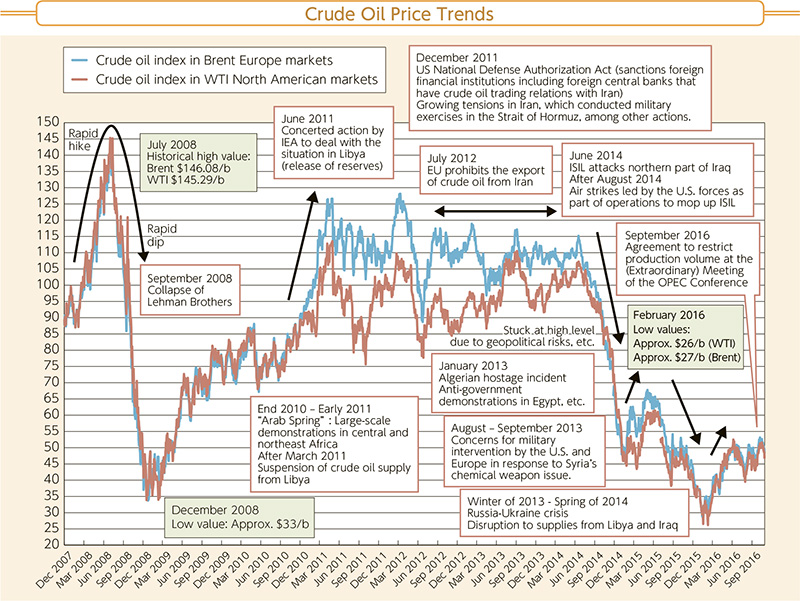
(B) Situation in Japan
Japan's reliance on fossil fuels for power generation reached about 90% after the Great East Japan Earthquake, while it had been about 60% before. The “Strategic Energy Plan” was approved by the Cabinet in 2014 with increasingly serious consideration being given to the securing of a stable supply of energy at reasonable prices, due to the undesirable impact of rising fuel procurement costs on the trade balance. In July 2015, based on the Strategic Energy Plan, the “Long-term Energy Supply and Demand Outlook” (outlook for the structure of energy supply and demand that can be realized if appropriate measures are taken based on the fundamental direction of energy policies laid down upon envisioning the policy objectives to be achieved, from the perspective of safety, stable supply of energy, economic efficiency and the eco-friendliness of the energy policies) was approved. Moreover, full liberalization of the electricity retail market began in Japan, in April 2016.
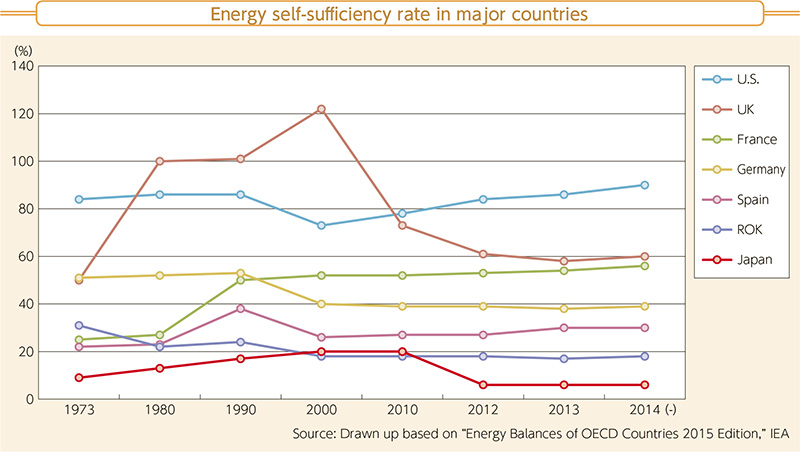
B Diplomatic Efforts to Secure a Stable Supply of Energy and Mineral Resources at Reasonable Prices
Securing a stable supply of energy and mineral resources at reasonable prices forms the foundation for the vital economy of Japan and the livelihoods of its people. Japan has been strengthening diplomatic efforts, focusing on the following activities.
(A) G7 Summit
In 2016, Japan led discussions on energy security as the G7 chair. The G7 Kitakyushu Energy Ministerial Meeting was held in May, in Kitakyushu City, Fukuoka Prefecture. As a result, the “Kitakyushu Initiative on Energy Security for Global Growth” was issued as a joint statement. This was also carried over to the G7 Ise-Shima Summit, and the G7 Ise-Shima Leaders' Declaration included a statement on the importance of initiatives to continue stable investment in quality energy infrastructure and upstream developments, which Japan prioritizes, and continue taking actions toward strengthening a transparent and flexible natural gas market. Moreover, the “CONNEX Guiding Principles towards Sustainable Development” were endorsed as part of the Leaders' Declaration. The CONNEX Initiative aims to realize Sustainable Development Goals (SDGs), and it is a framework for promoting the development of resources in a way that ensures the appropriate benefitting of emerging countries through cooperation by G7 countries in fostering human resources and legislation. Japan is actively involved in this framework.
(B) Strengthening Comprehensive and Mutually-Beneficial Ties with Resource- Rich Countries
In order to secure a stable supply of energy and mineral resources, Japan has been making efforts to strengthen comprehensive and mutually-beneficial ties with resource-rich countries at the leaders' and ministerial level and thorough cooperation utilizing its ODA, including technical cooperation and human resources development in the resource sector. In particular, since the inauguration of the Abe Administration, Prime Minister Abe, Foreign Minister Kishida, and Economy, Trade and Industry Minister Hiroshige Seko have engaged in proactive resource energy diplomacy while visiting major resource-rich countries or holding meetings with their leaders in North America, the Middle East, Africa, Latin America and the Asia-Pacific region. In 2016, Prime Minister Abe visited Russia and Mongolia, in addition to holding leaders' meetings with various countries in the Middle East (Iran, Qatar, Kuwait, Saudi Arabia, etc.), Kazakhstan, Brazil, etc., to strengthen bilateral ties.
(C) Ensuring Security of Transportation Routes
There have been threats posed by piracy along the sea lane stretching from the Middle East to Japan, through which approximately 80% of the total oil imports to Japan passes, and along other internationally important sea lanes such as those off the coast of Somalia and the Gulf of Aden. With this in mind, Japan has supported the coastal countries through such measures as enhancing the capability to enforce maritime law, cooperating on information sharing among countries concerned, and developing navigation facilities. Japan has also been dispatching units of the Japan Self-Defense Forces and Japanese Coast Guard officers to areas off the coast of Somalia and the Gulf of Aden to engage in escort operations of ships from all over the world (See 3-1-3(4) Oceans and Seas).
(D) Gathering and Analysis of Resource- Related Information at the Diplomatic Missions Overseas
With a view to strengthening the function of the diplomatic missions overseas, “Special Assistants for Natural Resources” have been assigned to 55 diplomatic missions overseas in 50 countries to work intensively for the acquisition and stable supply of energy and mineral resources (as of the end of December 2016). Furthermore, MOFA holds “Strategy Meetings on Natural Resources” by gathering officials who are assigned to the diplomatic missions overseas in countries, which are important in terms of ensuring a stable supply of energy and mineral resources. The meetings involve active discussions concerning current situations and the future direction of Japan's efforts for securing resources.
(E) Making Use of International Fora and Rules
Japan has actively participated in various International Energy Agency (IEA) activities for international collaboration and cooperation to maintain a stable supply of energy. Japan endeavors to strengthen its capability to respond to emergencies such as disruptions in oil supply, while striving to quickly and accurately grasp information, such as trends in the global energy markets, the medium and long-term outlooks for supply and demand, and trends in resource-producing countries. Moreover, in 2016, Japan hosted the Meeting of the Energy Charter Conference in Tokyo for the first time in East Asia. Japan led discussions as Chair of this meeting, which is the highest decision-making body of the Energy Charter Treaty (ECT) that prescribes liberalizing trade and transit, and protecting and promoting investment in the energy sector. The “Tokyo Declaration on the Energy Charter” was issued as an outcome document referring to the promotion of clean energy in an effort to simultaneously address the international issues such as energy security and climate change, ensuring the stability and transparency of the environment for investing in, e.g., quality infrastructure, and bolstering of outreach activities to attract new members to the ECT. Furthermore, with regard to LNG, Japan held the “LNG Producer-Consumer Conference 2016” (hosted by METI and the Asia Pacific Energy Research Centre (APERC)) in November 2016.
C Oceans and Seas (continental shelves and deep seabed)
As Japan is not abundant in energy and mineral resources on its land, marine living resources and natural resources in the continental shelf and the sea-bed and ocean floor and subsoil thereof beyond the limits of national jurisdiction (the Area) in the surrounding waters are important, from the perspective of securing stable supply sources and ensuring the sound development of the economy. Japan is proceeding with necessary measures to secure its interests at sea based on the United Nations Convention on the Law of the Sea (UNCLOS). Toward the establishment of its outer limits of the continental shelf beyond 200 nautical miles, Japan received the recommendations from the Commission on the Limits of the Continental Shelf (CLCS) in April 2012 in which four out of seven regions that Japan made its submission to the CLCS, were recognized and following this, in October 2014, Japan established extended continental shelves in two regions in accordance with the “Future Policy for Extending the Continental Shelf” decided by the Headquarters for Ocean Policy in July of the same year. Japan is also coordinating with a state concerned regarding another two regions and is making continuous efforts for early recommendations of the remaining one region, on which recommendations were deferred (See 3-1-6).
With regard to deep seabed, two Japanese contractors concluded contracts with the International Seabed Authority (ISA) and gained exclusive rights to explore for deep-sea mineral resources in a designated exploration area in search of manganese nodules and cobalt-rich ferromanganese crusts.
D Efforts toward Green Growth and a Low Carbon Society
Japan has been making contributions toward the realization of green growth and the promotion of a low-carbon society in the international community, including in developing countries (e.g., in human resources development and cooperation through international frameworks) through the use of renewable energy (solar, wind, biomass, geothermal, hydraulic, the use of the oceans, etc.) and promotion of energy-efficient technologies. With a view to disseminating and promoting the sustainable use of renewable energy, Japan has been engaged actively in the International Renewable Energy Agency (IRENA) and served as President of the Assembly in January 2015. Moreover, in March 2016, Prime Minister Abe expressed his intention to implement the “Fukushima Plan for a New Energy Society22” to promote Fukushima as the center of research into renewable energy. Regarding this plan, MOFA organized a study tour (Fukushima Study Tour) in August of the same year for diplomatic corps including ambassadors from various countries based in Tokyo, and they visited various places including the “Fukushima Renewable Energy Institute.” The tour promoted throughout the world Japan's proactive stance toward the spread and promotion of renewable energy.
- 22 Plan based on Prime Minister Abe's initiative to create a model in Fukushima for the realization of a future new energy society, while providing the world with information on this model, and establishing Fukushima as a pioneering location with regard to renewable energy and the future hydrogen society.
On November 25 and 26, 2016, the Meeting of the Energy Charter Conference was held in Tokyo, chaired by Foreign Minister Kishida. This Meeting brought together the observers and members that are party to the Energy Charter Treaty, which is the only multilateral legal framework that provides for the protection and liberalization of investment in the energy sector. The Meeting, held for the first time in East Asia, offered a space for engaging in discussions about future approaches. It was attended by 32 delegates at the Ministerial level, including the energy ministers of Iran, Georgia, and Uganda, as well as representatives from about 80 countries and international organizations. Lively discussions on energy issues took place during the Meeting.
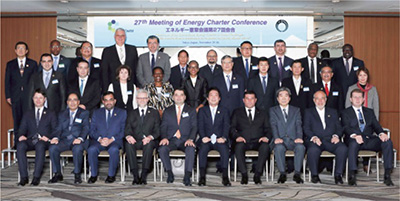 Ministerial level participants
Ministerial level participantsWith respect to the medium to long-term challenges of the energy situation faced by Japan, the importance of stable and continuous investment in the energy sector has been pointed out. On the demand side, energy consumption is expected to continue growing in emerging countries going forward, particularly in Asia. However, the impact of sluggish crude oil prices has contributed to a decline in investment in the energy sector for two consecutive years, and may threaten the stable supply of energy in the future. On the other hand, in response to the heightened interest in climate change issues after the Paris Agreement came into effect in November 2016, it is expected that the investment in the energy sector will contribute to promoting clean energy and energy efficiency. In light of these circumstances, the importance of investment in ensuring energy security was affirmed at this Meeting of the Energy Charter Conference. The Meeting also provided an opportunity for coming up with the future image of the Energy Charter processes that can contribute to global issues including sustainable development and climate change. The discussions were summarized in the outcome document, “Tokyo Declaration on the Energy Charter.”
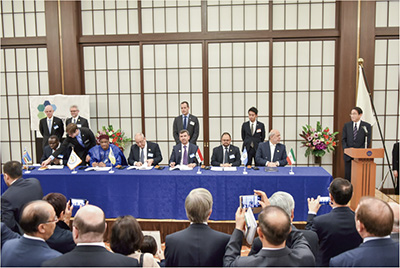 Scene of the signing ceremony held at the Iikura Guest House of the Ministry of Foreign Affairs
Scene of the signing ceremony held at the Iikura Guest House of the Ministry of Foreign AffairsThis Meeting of the Energy Charter Conference also welcomed the signing of the International Energy Charter (a political declaration that supports the modernization of the Energy Charter Treaty) by Iran, Iraq, Guatemala, and three regional organizations in Africa, which acquired Observer status to the Energy Charter Conference. In his speech delivered during the signing ceremony, Foreign Minister Kishida noted that the expansion in contracting parties to the Energy Charter Treaty and the growing universality of the International Energy Charter hold great potential for contributing to stabilizing global energy demand and supply, and strengthening the energy security. Taking the opportunity of this Meeting of the Energy Charter Conference held in Tokyo, the participation of an increasing number of countries in the Energy Charter Treaty is highly anticipated going forward.
In addition to securing a stable supply of energy for Japan, in the aspect that Japan communicated clearly to the world its energy diplomacy stance of contributing to the achievement of the Sustainable Development Goals (SDGs) through the realization of global energy security, the success of this Meeting of the Energy Charter Conference and the Tokyo Declaration on the Energy Charter could be described as the culmination of Japan's diplomacy efforts in the energy sector for 2016, the year Japan assumed the G7 presidency. To secure a stable supply of energy, which is the foundation for robust economic growth, Japan will continue to put effort into energy and resource diplomacy going forward.
(2) Ensuring Food Security
According to the latest UN report, the world population is estimated to increase to approximately 9.7 billion people by 2050. The Food and Agriculture Organization of the UN (FAO) estimated in 2012 that by 2050, global food production must be about 60 percent higher than that of 2005 – 2007 in order to ensure adequate food for the increased population. Since Japan relies on imports for a lot of its food, ensuring global food security is directly connected to securing a stable food supply for Japan. While increasing domestic food production, it is necessary to simultaneously promote global food production and contribute to the establishment of stable markets of agricultural products and trade systems.
Regarding starvation, which is a pressing issue in global food security, the target of halving the percentage of people suffering from hunger between 1990 and 2015, was set as one of the Millennium Development Goals (MDGs). This target has almost been achieved in developing regions, with the actual undernourished population decreasing by more than 100 million over the past 10 years, or by more than 200 million when compared to 1990 – 1992 levels. On the other hand, according to the “State of Food Insecurity in the World 2015” issued by FAO, the International Fund for Agricultural Development (IFAD) and the World Food Programme (WFP), about 795 million people remain undernourished around the world. Moreover, although international grain prices, which affect people's access to food, have remained low compared to the period around 2007 – 2008 when prices spiked, prices remain volatile due to the weather and other factors. In light of such issues in securing a stable supply of food, the international community, including Japan, has a responsibility to contribute to the achievement of the Sustainable Development Goals (SDGs) (Goal2) in the 2030 Agenda for Sustainable Development to alleviate this situation of people in developing countries suffering from food insecurity, and to end hunger by 2030, by vitalizing global partnerships.
A Efforts in the International Frameworks Concerning Food Security
At the G7 Ise-Shima Summit held in May 2016, Japan led the formation of the “G7 Vision for Action on Food Security and Nutrition” as part of the Leaders' Declaration. This vision laid out specific actions to be taken in cooperation among G7 countries based on the goal to “lift 500 million people in developing countries out of hunger and malnutrition by 2030,” set during the G7 Summit 2015 in Schloss Elmau (in Germany), and the “Broad Food Security and Nutrition Development Approach” developed to achieve this target. The three prioritized areas in this vision for action are (1) empowering women within agriculture and food systems, (2) improving nutrition through a people-centered approach, and (3) ensuring sustainability and resilience within agriculture and food systems. Moving forward, Japan will promote the G7 initiative by ensuring the implementation of actions. Moreover, the G7 Agriculture Ministers' Meeting was held in Niigata City, Niigata Prefecture, in April, and discussions were held on policies and initiatives needed to handle new issues on agriculture, with the results being compiled in the G7 Niigata Agriculture Ministers' Meeting Declaration.
Furthermore, at the Sixth Tokyo International Conference on African Development (TICAD VI: Held in Nairobi Kenya), Japan declared its policy of supporting the boosting of agricultural productivity such as by spreading rice-growing techniques among the Coalition for African Rice Development (CARD) as an initiative to strengthen food security in Africa. In addition, it was announced that the Initiative for Food and Nutrition Security in Africa (IFNA) would be launched as a joint project implemented in cooperation with the New Partnership for Africa's Development (NEPAD) and other initiatives and organizations in the African region.
Moreover, at the APEC Ministerial Meeting on Food Security held in September in Peru, the Piura Declaration on APEC Food Security was adopted, summarizing the specific initiatives to be implemented to strengthen food security among APEC countries. The ministers agreed to ensure the promotion of initiatives to bolster food security in accordance with the specific conditions within APEC regions.
In addition, at the ASEAN+3 Summit Meeting in September, Prime Minister Abe mentioned that Japan provided rice assistance to the Philippines and Cambodia based on the ASEAN+3 Emergency Rice Reserve (APTERR Agreement), which entered into force in 2012, and that Japan intended to further expand public-private partnerships to establish food value chains, which are promoted by Japan. He also asked for relaxing and lifting the import restrictions that some countries have placed on Japanese food products regarding the nuclear accident.
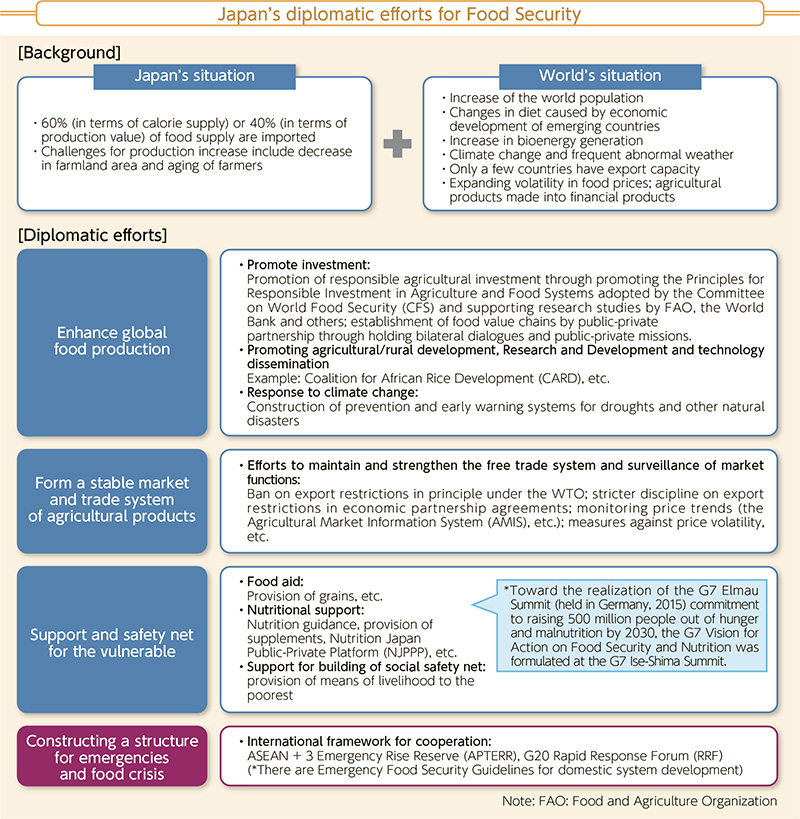
B Japan's Efforts to Promote “Responsible Agricultural Investment”
While promoting international agricultural investments aimed at increasing global food production, large-scale “land grabbing” in developing countries has been a concern. In light of this issue, Japan advocated the concept of “Responsible Agricultural Investment” at the G8 L'Aquila Summit held in Italy in 2009, so that investments would be promoted in a manner to create a triple win situation for recipient countries, local communities, including smallholders, and investors. In April 2010, four international organizations (FAO, IFAD, the United Nations Conference on Trade and Development (UNCTAD), and the World Bank (WB)) adopted the “Principles for Responsible Agricultural Investment (PRAI). Building on this, the “Principles for Responsible Investment in Agriculture and Food Systems” was adopted at the general assembly of the Committee on World Food Security (CFS) in October 2014. At the G7 Ise-Shima Summit in 2016, these principles were also incorporated into the “G7 Vision for Action on Food Security and Nutrition,” mentioned above, forming the basis for actions to be taken by G7 countries. Japan will continue to lead the execution of these principles as the main issues in realizing worldwide food security.
(3) Fisheries (Including Tuna and Whaling Issues)
Japan is one of the major fishing and consuming countries of marine products in the world and plays an active role in the proper conservation, management and sustainable use of living marine resources.
With respect to tuna, Japan, as one of the largest tuna-consuming countries, has joined all Regional Fisheries Management Organizations (RFMOs) for tuna, including the Western and Central Pacific Fisheries Commission (WCPFC), whose convention area includes waters around Japan, and Japan leads discussions on strengthening measures for the conservation and management of the resources. In 2016, International Commission for the Conservation of Atlantic Tunas (ICCAT) conducted the second performance review by independent reviewers, which highly appreciated the long-term efforts by the ICCAT and its members, while the increase of the Total Allowable Catch (TAC) for Atlantic Bluefin tuna for three consecutive years was confirmed. Moreover, South Africa became a new member of the Commission for the Conservation of Southern Bluefin Tuna (CCSBT). At the annual meeting of the CCSBT, a resolution was adopted to prohibit large-scale high seas driftnet fishing, in addition to agreeing to set the TAC increase to the current 3,000 tons for three years after 2018.
Upon Japan's proposal, the North Pacific Fisheries Commission (NPFC), covering high seas fishing for Pacific saury, mackerel species, splendid alfonsino, etc., adopted conservation and management measures to limit the number of ships with permits to fish for chub mackerel, and implement procedures to prepare a list of illegal, unreported, and unregulated (IUU) fishing vessels.
With regard to the Japanese eel (Anguilla japonica), which was listed as an endangered species in 2014 by the International Union for Conservation of Nature and Natural Resources (IUCN), and was also discussed at the 17th meeting of the Conference of the Parties (CoP17) to the Convention on International Trade in Endangered Species of Wild Fauna and Flora (CITES), Japan continues to hold consultations within the East Asia region in order to establish an international framework on conservation and management of the species.
Moreover, as IUU fishing, carried out by ships operating in a disorderly manner, becomes a major threat to sustainable fishing, Japan takes the posture to proactively work against the IUU fishing, including stressing the importance of implementing measures aimed at preventing IUU fishing through the Foreign Ministers' Statement on Maritime Security issued at the G7 Hiroshima Foreign Ministers' Meeting held in April.
Regarding the whaling issue, under the basic policy of pursuing the resumption of commercial whaling by conducting scientific whale research programs, based upon international law and scientific evidence in order to gather scientific data that is necessary for the proper management of whale resources, Japan developed and conducted the “New Scientific Whale Research Program in the Antarctic Ocean (NEWREP-A)” from December 2015 to March 2016, which was finalized taking into account the Judgment of the International Court of Justice (ICJ), in March 2014, and issues pointed out by the Scientific Committee of the International Whaling Commission (IWC). Moreover, regarding the western North Pacific, a proposal for the New Scientific Whale Research Program in the Western North Pacific (NEWREP-NP) was submitted to the Scientific Committee of the IWC in November 2016. The program will be finalized through discussions held by the Scientific Committee. Anti-whaling countries occupy the majority at the IWC, and the international situation regarding whaling still remains difficult, but based on international law and scientific evidence, Japan is making persistent efforts to deepen understanding among the international community.
(4) Foreign Direct Investment in Japan
The target to double foreign companies' direct investment in Japan to 35 trillion yen (24.4 trillion yen as of the end of 2015) by 2020, addressed in the 2013 “Japan Revitalization Strategy,” was reaffirmed in the “Growth Strategy.” With the “Council for Promotion of Foreign Direct Investment in Japan,” which has been held since 2014 to spearhead the initiative to promote activities for discovering and attracting investments, while gathering opinions from foreign company managers, Japan continues to make further progress in implementing additional measures such as regulatory and institutional reforms contributing to the improvement of the investment environment in Japan, responding to the needs of foreign companies, and supporting measures to expand investments effectively.
Based on the “Five Promises for Attracting Foreign Businesses to Japan23” adopted by the 2nd Council for Promotion of Foreign Direct Investment in Japan in March 2015, foreign companies have made use of one of the five promises, the “Investment Advisor Assignment System24,” since April 2016, to hold meetings with the Assigned State Minister. Moreover, at the 4th Council for Promotion of Foreign Direct Investment in Japan held in May 2016, a policy package for promoting foreign direct investment in Japan with the aim of making Japan a global hub for trade and investment was laid down, and reflected in the “Basic Policy on Economic and Fiscal Management and Reform 2016” and the “Growth Strategy.”
MOFA has been implementing the measures adopted by the Council for Promotion of Foreign Direct Investment in Japan, as well as initiatives making use of diplomatic resources through diplomatic missions overseas. Efforts are being made to strengthen the system of gathering information on identifying cases of foreign direct investment in Japan, and “contact points for Direct Investment towards Japan” were established at 126 diplomatic missions overseas in April 2016 to create a system for supporting such investments. As points of contact for communication and coordination, they have been working in collaboration with the Japan External Trade Organization (JETRO). They are also engaging in related support activities, and are carrying out surveys of case studies in various countries, and surveys of requests for improvements to Japanese regulations and systems, as well as calling for investments in Japan by making maximum use of networks of contacts at diplomatic missions overseas, holding events for promoting foreign direct investment in Japan, and implementing other proactive initiatives. In July 2016, JETRO held the first Invest Japan Seminar (with the support of the Embassy of Japan in Viet Nam) in Viet Nam. Other than that, Japan is engaging in various strategic initiatives with the aim of promoting foreign direct investment in Japan, from within and outside Japan, through “top-level sales” by government officials and associated organizations, such as the holding of “Investment Japan Seminars” by Prime Minister Abe (hosted by JETRO) in September 2016, during his visit to the U.S., and an “INVEST JAPAN Forum 2016” (hosted jointly by associated ministries, agencies and JETRO) held in October 2016, in Tokyo.
- 23 (1) Bolstering of the multilingualization of the service in the retail industry, restaurants, medical institutions, public transportation, etc., (2) Promoting the preparation of free public wireless LAN in cities and simplifying procedures for use, (3) creating an environment in which all regional airports are able to receive business jets with short advance notice, (4) support for international students in looking for employment in Japan, and (5) the implementation of the âInvestment Advisor Assignment System.â
- 24 A system in which a State Minister will be assigned as an advisor to each foreign company that has made important investments in Japan. A State Minister will be assigned according to the company's field of specialty, and the State Minister for Foreign Affairs will attend all meetings.

